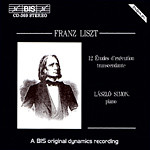
12 etudes d´exacution transcendante
 $33.29
Out of Stock
$33.29
Out of Stock6+ weeks add to cart
LISZT
12 etudes d´exacution transcendante
Laszla Simon (piano)
[ BIS / CD ]
Release Date: Saturday 1 January 2000
This item is currently out of stock. It may take 6 or more weeks to obtain from when you place your order as this is a specialist product.
"Simon's is no mean achievement. He can fairly claim to have come close to his stated wish "to work out both … their visionary character in the tonal sphere as well as the orchestral character of their structure”."
(MusicWeb April 2007)
"Simon is heard to play with a powerful, somewhat bass-oriented tone. Perhaps this is not surprising from a pupil of Claudio Arrau. However, since his own brief introductory note stresses his primary concern with Liszt's "visionary conceptions”, this massive, full sound was probably part of him from the beginning. He also studied with Ilona Kabos who came from the same background as Ilonka Deckers-Küszler, which may explain his preference for musicality over virtuoso display. Not that his technique is a mean one, I hasten to say...Simon's is no mean achievement. He can fairly claim to have come close to his stated wish "to work out both … their visionary character in the tonal sphere as well as the orchestral character of their structure”."
(MusicWeb April 2007)
Franz (Ferenc) Liszt was a Hungarian composer and one of the most famous pianists ever. He started his musical career very early as a child prodigy, and studied with Antonio Salieri and Carl Czerny in Vienna. He then moved with his family to Paris in 1823, where he studied with composer Anton Reicha.
Liszt was friends with many of the cultural icons of the 19th century, such as composers Hector Berlioz, Richard Wagner and Frederic Chopin, as well as artist Eugene Delacroix and poet Heinrich Heine. One of the most important meetings in Liszt's early life was his witnessing of the concerts of diabolical violinist Niccoló Paganini, something which is said to have inspired him in his quest to make the piano the supreme virtuostic instrument.
(lisztworks.com)
Tracks:
1. Preludio 0'47
2. Molto vivace 2'13
3. Paysage 5'04
4. Mazeppa 7'47
5. Feux follets 3'41
6. Vision 5'19
7. Eroica 4'45
8. Wilde Jagd 5'20
9. Ricordanza 9'45
10. Allegro agitato molto 4'20
11. Harmonies du soir 9'37
12. Chasse-neige 5'26


